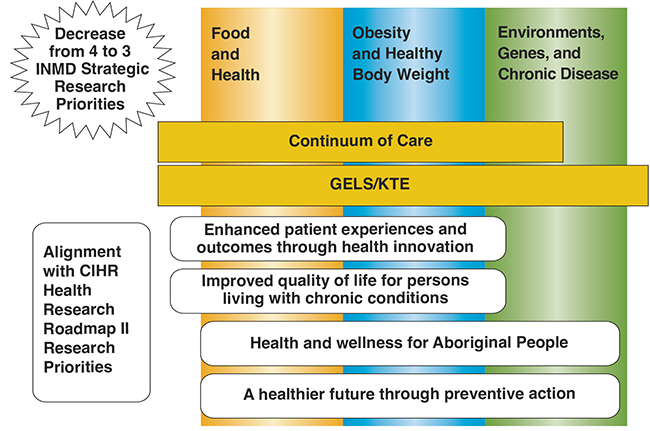CIHR Institute of Nutrition, Metabolism and Diabetes – Refreshed Strategic Plan, 2015-2018
Notice
The information is provided in the language in which it was submitted by the recipient.
Table of Contents
- Message from the Scientific Director
- Introduction and Background:
- The Refresh
- References
- Appendix 1: INMD Supported Initiatives Related to Continuum of Care
- Appendix 2: Programmatic Grants in Food and Health
- Appendix 3: Environments, Genes and Chronic Disease
- Appendix 4: INMD Management Team
- Appendix 5: INMD Institute Advisory Board
Message from the Scientific Director

It is with great optimism that I present this refreshed Strategic Plan for the Canadian Institutes of Health Research (CIHR) Institute of Nutrition, Metabolism, and Diabetes (INMD). The plan reinvigorates the strategic activities of INMD, renews the strategic priorities, strengthens established relationships with other institutes and community partners, builds on successes of the last five years and guides the path forward.
Supporting excellence in health research remains the raison d’être of CIHR. During these times of change, as Scientific Director I strongly reaffirm my determination to continue to address INMD strategic priorities through targeted research initiatives. With the current climate of research funding, partnerships play a crucial role in the health research enterprise, so I am committed to enhancing established partnerships and cultivating new national and international partnerships to create additional opportunities for researchers across the INMD mandate.
Over the past five years, INMD has built research capacity across the mandate. I am proud of our accomplishments in all four INMD strategic research priorities, as evidenced by the targeted research initiatives, and the partnerships INMD established to enable them, which are highlighted in this report. This refreshed strategic plan provides an opportunity for INMD to tackle some of the greatest health challenges facing Canadians today. The priorities also position INMD to contribute to the overall success of CIHR in achieving the Strategic Directions established in Health Research Roadmap II: Capturing innovation to produce better health and health care for Canadians Strategic Plan 2014-15 – 2018-19.
Thanks to members of the INMD Institute Advisory Board and all those in the INMD research community who contributed to the refresh of this Strategic Plan. I look forward to meeting with researchers to share the vision and with partners to collaborate on areas of mutual interest. I am confident that INMD’s three complementary strategic research priorities serve to address challenges associated with the diet-environment-health trilemma (Tilman and Clark, 2014) and to ensure that INMD continues to have a major impact on improving the health of all Canadians.
Philip M. Sherman, MD, FRCPC
Scientific Director, CIHR Institute of Nutrition, Metabolism and Diabetes
February 2015
Introduction and Background
The Canadian Institutes of Health Research
The Canadian Institutes of Health Research (CIHR) is the major federal agency responsible for funding health research in Canada. Created under the CIHR Act, which came into force in June 2000, it is comprised of 13 virtual institutes that are mandated to support health research in four major areas:
- biomedical
- clinical
- health systems and services, and
- population and public health.
CIHR’s mandate is to excel, according to internationally accepted standards of scientific excellence, in the creation of new knowledge and its translation into improved health for Canadians, more effective health services and products, and a strengthened Canadian health care system.
In August 2014, CIHR’s Governing Council announced the completion of the Institutes Model Review. As mandated in the CIHR Act and as recommended by the 2011 International Review Panel, this review assessed the structure, role, policies, financial framework, and slate of CIHR Institutes. This review will result in changes to the structure and role of the Institutes, Scientific Directors and Institute Advisory Boards (IAB).
Institute of Nutrition, Metabolism and Diabetes
The mandate of the Institute of Nutrition, Metabolism, and Diabetes (INMD) is to support research to enhance health in relation to diet, digestion, excretion, and metabolism; and to address causes, prevention, screening, diagnosis, treatment, support systems, and palliation for a wide range of conditions and problems associated with hormone, digestive system, kidney, and liver function.
INMD’s vision is to position Canada as a leader in the creation of knowledge through health research in relation to diet, digestion, excretion and metabolism that benefits all Canadians and the global community.
Unlike the other twelve institutes within CIHR, INMD pursued a single strategic focus on Obesity and Healthy Body Weight from its inception until 2009. The 2011 International Review Panel observed that INMD “has had an impact in presenting a focus for obesity research and, in that sense, has had a transformative impact on the community.” This conclusion was based on the results of a bibliometric analysis of obesity research in Canada, and an Internal Assessment Report that INMD prepared for the Expert Review Team, which are both available on the CIHR web site.
In 2010, INMD released a new Strategic Plan 2010-2014, which broadened INMD priorities from one to four (Sherman et al, 2011):
- food and health
- environments, genes and chronic disease
- continuum of care, and
- obesity and health body weight: seeking solutions.
As noted in the 2011 International Review, the increase in the number and scope of Strategic Research priorities was viewed as a more inclusive strategy.
The Refresh
The INMD Strategic Plan refresh for 2015-2018 renews the INMD Strategic Plan 2010-2014 by fine-tuning its strategic research priorities to ensure that INMD contributes to the overall success of CIHR by aligning with Health Research Roadmap II: Capturing innovation to produce better health and health care for Canadians Strategic Plan 2014-15 – 2018-19. The refresh also ensures that INMD strategic research priorities continue to result in INMD funding innovative, targeted research that provides immediate opportunities for implementation to improve the health of Canadians and the Canadian health care system in partnership with researchers, voluntary health organizations, professional associations and governments working in the INMD mandate area.
As part of the refresh, the INMD Institute Advisory Board (IAB) met with partners to discuss progress on advancing the four strategic priorities, and to seek input. Working groups of the IAB then reviewed data provided from the CIHR Open and Strategic Competitions to determine how well the four strategic priority areas have been addressed. This work culminated when members of the IAB met to present their findings and discuss recommendations for moving forward. In addition, a web-based survey was launched to ask INMD stakeholders more broadly to provide input regarding future directions for INMD. INMD also consulted with Federal Health Portfolio partners from both Health Canada and the Public Health Agency of Canada.
Discussion at the IAB focused on Continuum of Care, and whether it should remain a separate strategic priority for INMD. After extensive consultation, it was determined that INMD objectives for Continuum of Care will be best addressed through the Strategy for Patient-Oriented Research (SPOR) in a way that INMD could not do alone. In addition, the IAB recommended that INMD embed Continuum of Care research priorities into the other three strategic research priorities, so that the results of the targeted research will be used to improve patient care and health care delivery, where appropriate.
INMD has strongly supported the development of SPOR, including hosting a Diabetes and Related Complications National Research Network Strengthening Workshop in January 2014. The Workshop was planned in response to multiple Expressions of Interest in areas of diabetes and related complications submitted to the SPOR Chronic Disease Networks competition. In addition, INMD is a collaborator on the SPOR Primary and Integrated Health Care Innovations (PIHCI) Network.
INMD has supported a number of other CIHR strategic research initiatives related to Continuum of Care over the past five years. INMD supports the Canadian Kidney Knowledge Translation and Generation Network (CANN-NET), which is being used as a model for patient and citizen engagement for SPOR, as described in Appendix 1. To further support Continuum of Care, INMD partnered with the Children with Intestinal and Liver Disorders (CH.I.L.D.) Foundation to fund the Canadian Children Inflammatory Bowel Disease Network. INMD also contributed to the Community-Based Primary Healthcare Roadmap Signature Initiative.
Overall, consultations undertaken confirm that INMD is addressing transformational strategic research priorities. While Continuum of Care remains an important and relevant issue to INMD, in the refresh it is no longer considered a strategic priority since objectives for Continuum of Care are largely addressed through SPOR.
The three remaining INMD strategic research priorities: Food and Health; Environments, Genes and Chronic Disease; and, Obesity and Healthy Body Weight: Seeking Solutions, begin to address some of the challenges associated with the diet-environment-health trilemma (Tilman and Clark, 2014) and will remain the strategic research priorities for INMD in 2015-2018. These priorities align with the CIHR Strategic Plan, Health Research Roadmap II: Capturing innovation to produce better health and health care for Canadians Strategic Plan 2014-15 – 2018-19, as depicted in Figure 1 below.
Figure 1: Revised INMD Strategic Priorities and Alignment with Roadmap*

Long description: Revised INMD Strategic Priorities and Alignment with Roadmap
* Roadmap refers to the CIHR Strategic Plan, Health Research Roadmap II: Capturing innovation to produce better health and health care for Canadians Strategic Plan 2014-15 – 2018-19.
GELS/KTE= Cross-cutting elements: Gender, Ethical, Legal, Social/Knowledge Translation and Exchange.
Refreshed INMD Strategic Research Priorities 2015-2018
Strategic Priority 1: Food and Health
In the INMD Strategic Plan for 2010-2014, INMD committed to support research to develop a stronger evidence base to inform future nutritional practice and food policy. This included fostering research on the total diet and specific nutrients to enhance health and reduce the risk of chronic disease. The evaluation of biomarkers of nutritional adequacy, emerging innovations in food engineering, and ethical issues posed by these changes particularly with respect to people with vulnerabilities were noted as priority areas for strategic research funding.
The overarching aim of this strategic priority is to foster research on food and health that results in improved nutritional status at the population level, compresses morbidity in relation to chronic disease, and provides support for evidence-informed policies and practice.
Progress to Date:
In advancing this Strategic Research Priority, INMD held a national Workshop, Advancing Food and Health Research Priorities, to consult with stakeholders, including representatives from government, the research community and the private sector, along with International experts who attended the Workshop. As a result of this Workshop, INMD launched Programmatic Grants in Food and Health (Appendix 2) in partnership with the CIHR/Rx&D Collaborative Research Program as well as Health Canada (Bureau of Nutritional Sciences, Office of Nutrition Policy and Promotion, and First Nations and Inuit Health Branch); Public Health Agency of Canada; Agriculture and Agri-Food Canada; the Centrum Foundation of Pfizer Consumer Healthcare; AllerGen NCE Inc.; Canada Foundation for Innovation and The Micronutrient Initiative. This funding opportunity resulted in six Programmatic Grants in Food and Health being funded, an example is featured above, for an investment of $11M over five years. An overview of the initiative is provided in Appendix 2 along with a table listing grant recipients.
INMD also worked closely with Health Canada and the Public Health Agency of Canada to host a related national workshop, Developing a Research Agenda to Support Sodium Reduction (Sherman et al., 2014). The outcomes of this workshop provided the basis for research recommendations contained in the Sodium Reduction Strategy for Canada (Minister of Health, 2010). With the release of the Strategy, INMD launched targeted funding opportunities to support sodium reduction research in Canada, including one partnered funding opportunity with NSERC (Natural Sciences and Engineering Research Council of Canada), an example of which is featured below.
Moving Forward:
INMD will continue to prioritize Food and Health through a partnership with European countries in a Joint Programme Initiative: A Healthy Diet for a Healthy Life (JPI HDHL). The JPI HDHL is a partnership between 25 European member states and associated countries. Through this JPI, INMD has contributed to the Strategic Research Agenda and participated in a joint funding opportunity, Biomarkers for Nutrition and Health. INMD continues to seek opportunities to advance Food and Health research through partnerships and knowledge translation activities.
Strategic Priority 2: Environments, Genes and Chronic Disease
The INMD Strategic Plan 2010-2014 outlines the need for research to identify the influence of the environment and genes on the development of chronic disease, as well as the need to acquire knowledge on the phenotypic variation of both complex and rare diseases, interactions with the human microbiome, and the health consequences of changes in natural and built environments.
The objectives of this Strategic Priority were to:
- enhance the knowledge base of natural environments and built environments relating to the pathobiology of both common and rare chronic diseases.
- support research evaluating the role of environments on chronic disease (e.g., inflammatory bowel diseases, metabolic syndrome).
- advance research on rare diseases, understanding that this approach ultimately benefits the health of all Canadians.
Progress to Date:
INMD collaborated with other CIHR Institutes to support research related to various aspects of this Strategic Priority, including:
- Canadian Microbiome Initiative,
- Rare Diseases: Translating Basic Biology to Enhanced Patient Care (see example below),
- Canadian Epigenetics, Environment and Health Research Consortium (Roadmap Signature Initiative), and the
- Inflammation in Chronic Disease (Roadmap Signature Initiative).
In February 2012, INMD hosted a National Workshop on Environments, Genes and Chronic Disease. This workshop identified strengths, gaps and opportunities in this field of research to inform the development of relevant targeted funding opportunities.
In 2013-14, INMD funded twenty-one Catalyst Grants in Environments, Genes and Chronic Disease ($2.1M over one year) in collaboration with eight other institutes and three external partners. The catalyst grants covered a wide breadth of research topics, including: deciphering pathways associated with tissue destruction in celiac disease; epigenetic effects of early life exposure to antibiotics on genes relevant for metabolic disease and immune tolerance; and early life nutrition, antibiotics, infection and bacterial sensing in the regulation of diabetes and obesity (see Appendix 3).
INMD is now co-leading the CIHR Environments and Health Roadmap Signature Initiative in collaboration with the Institutes of Infection and Immunity; Population and Public Health; Circulatory and Respiratory Health; and Human Development, Child and Youth Health.
Moving Forward:
INMD will continue to prioritize Environments, Genes and Chronic Disease. In November 2014, as part of the Environments and Health Signature Initiative, INMD launched a funding opportunity, Programmatic Grants in Environments, Genes and Chronic Disease. This call for Programmatic Grants was launched in collaboration with the CIHR Institutes of Aging; Infection and Immunity; Human Development, Child and Youth Health; and in partnership with the Canadian Association of Gastroenterology; Crohn’s and Colitis Canada; Cystic Fibrosis Canada; the Heart and Stroke Foundation; the Kidney Foundation of Canada, and the National Research Council. The funding opportunity will support research to advance our understanding of how environment-gene or environment-microbiome-gene interactions contribute to chronic, non-communicable diseases. INMD looks forward to attracting and engaging additional partners to support this research funding initiative.
Strategic Priority 3: Obesity and Healthy Body Weight: Seeking Solutions
In the INMD Strategic Plan 2010-2014, the Institute committed to supporting research on solution-focused interventions related to obesity at the clinical, policy, and population health level. Emphasis was placed on fostering research on priority populations (including children, Aboriginal peoples and severely obese individuals), and knowledge translation to improve prevention approaches and enhance weight management strategies.
INMD committed to supporting knowledge creation with respect to this research priority by:
- focusing on solutions to promote healthy body weights at the population level (e.g., school-based approaches, intervention research).
- concentrating on interventions to prevent and manage obesity that align with CIHR’s Strategy for Patient-Oriented Research that:
- evaluate the outcomes of specialized treatment services;
- provide a comparative analysis of clinical outcomes for bariatric surgical procedures;
- advance understanding of underlying mechanisms of action of various bariatric surgery options.
Progress to Date:
In 2010, INMD co-hosted a national workshop with the Canadian Obesity Network (CON), focused on bariatric care research. Bariatric care includes lifestyle intervention and modification, cognitive and behavioural therapies, pharmacotherapy and surgery, used individually or in combination. As a result of long term relationships built to support this initiative, INMD launched a Team Grants in Bariatric Care research funding opportunity in 2014. The call for these Team Grants was launched in partnership with Alberta Innovates - Health Solutions (AIHS) and Alberta Health Services Obesity, Diabetes and Nutrition Strategic Clinical Network (SCN); Ontario Ministry of Health and Long-Term Care; Fonds de recherche du Québec–Santé (FRQS), and CON. An outstanding example of how this funding attracted a multi-disciplinary team and network of researchers along with end-of-research users in the community is highlighted for one of the funded Bariatric Team Grants below.
Moving Forward:
Obesity and its complications remain an important population health challenge. INMD will continue to support obesity research that focuses on treatment and prevention, through Signature Initiatives such as Pathways to Health Equity for Aboriginal People and SPOR, and will facilitate knowledge translation to ensure that research in this area is used to inform health policies and programs.
Research Capacity Building in the INMD Mandate Areas
INMD supports capacity building through partnerships with voluntary health organizations and health professional associations. New Investigator Meetings are a mentoring and capacity-building activity for the Institute, with focus on investigators in their first five years of their first faculty appointment. To date, INMD has hosted five of these meetings, two of which were joint meetings with other institutes. INMD New Investigator Meetings focus on building capacity to enhance participants’ success in obtaining future peer reviewed grant funding, facilitate interactions and collaborations among New Investigators, support the development of partnership and knowledge translation skills, and provide opportunities for New Investigators to be mentored by more established Canadian researchers.
In addition, INMD partners with the Canadian Association of Gastroenterology (CAG) and Crohn’s and Colitis Canada (CCC) to support capacity building in gastroenterology and with the Canadian Society of Nephrology and the Kidney Foundation of Canada (KFOC) to increase nephrology capacity. These capacity building initiatives are based on long-standing partnerships that have been positively evaluated and which leverage CIHR funding, increase capacity, result in patents being filed, and advance knowledge in their respective fields, as demonstrated below.
Support of Knowledge Translation & Exchange and Ethics
INMD will continue to emphasize knowledge translation and exchange and ethics by expanding boundaries with both established and new partners to co-design and co-fund transformational initiatives. For example, INMD partners with the Canadian Nutrition Society to host symposia at their annual conferences. These symposia profile CIHR-funded Food and Heath research and provide knowledge translation opportunities to the broader nutrition community that includes clinicians, representatives from government and industry, as well as academics.
INMD will continue to promote ethical principles of health research, contribute to CIHR’s ethics mandate, as described in Roadmap, and to embed ethics in INMD activities. For example, INMD included ethical considerations in the Team Grants in Bariatric Care, by creating a funding opportunity to advance comparative health services research and knowledge translation in bariatric care to improve the management of severe obesity. It was stated that, “research under this objective may include consideration of patient values and expectations, and familial and social impacts associated with bariatric surgery and the medical management of severe obesity.”
Evaluation
INMD is committed to evaluating the outputs and outcomes of the research that has been funded through the INMD strategic plan. CIHR is developing a robust approach to evaluation and monitoring, which includes a plan for regular assessment of institute performance. This approach will build on learning from approaches being used to evaluate priority-driven funding of health research internationally by other funding organizations. Assessing the concept of the strength of science is inherently complex and multi-dimensional and cannot be measured by using a single indicator. Accordingly, a multi-lens approach will be used that incorporates both qualitative and quantitative measures, including bibliometrics, surveys, and data analyses (Expert Panel, 2012). A performance measurement regime has been adopted by CIHR, which includes the following categories:
- Advancing knowledge - discoveries/breakthroughs, contributions to the scientific literature (grey or peer-reviewed) and may include measures of research quality, activity, outreach and structure.
- Building capacity - the development and enhancement of research skills in individuals and teams, additional research-activity funding (e.g., funding partnerships) as well as the development/enhancement of platforms.
- Informing decision-making - includes the impacts of health research in the areas of health related decision-making (i.e., science/research, general public, clinical and managerial decision-making, practice and policy and health products decision making).
- Health and Health System impacts - advances in the prevention, diagnosis, treatment and palliation as well as changing health status and determinants of health. This category also includes advances and efficiencies in the way the health system functions
- Broad economic and social impacts - commercialization of research discoveries, human capital gains, health benefits (specific costs of implementing research findings in the broad health system), well-being and social benefit indicators.
Below is an example illustrating the types of indicators that will be used under the respective categories of the performance measurement regime to evaluate INMD funded targeted research.
| Category | Description | Potential indicators |
|---|---|---|
Advancing knowledge |
discoveries/breakthroughs, contributions to the scientific literature (grey or peer-reviewed) and may include measures of research quality, activity, outreach and structure |
|
Building capacity |
the development and enhancement of research skills in individuals and teams, additional research-activity funding (e.g., funding partnerships) as well as the development/enhancement of platforms |
|
Informing decision-making |
includes the impacts of health research in the areas of health related decision-making (i.e., science/research, general public, clinical and managerial decision-making, practice and policy and health products decision making) |
|
Health and Health System impacts |
advances in the prevention, diagnosis, treatment and palliation as well as changing health status and determinants of health. This category also includes advances and efficiencies in the way the health system functions |
|
Broad economic and social impacts |
commercialization of research discoveries, human capital gains, health benefits (specific costs of implementing research findings in the broad health system), well-being and social benefit indicators. |
|
Conclusions
Health research in the areas of the INMD mandate – diet, digestion, excretion, and metabolism – continues to be vital to the health of Canadians and in improving the Canadian health care system. This refreshed INMD Strategic Plan, 2015-2018 will result in targeted research initiatives that align with the CIHR Strategic Plan, Health Research Roadmap II: Capturing innovation to produce better health and health care for Canadians Strategic Plan 2014-15 – 2018-19 and leverage CIHR investments in open, investigator-initiated research programs. We will engage partners and stakeholders with a shared interest in supporting health research and in translating research discoveries and outcomes to benefit Canadians.
References
- Canadian Institutes of Health Research 2011. Advancing Food and Health Research Priorities – Workshop Report. [Accessed 1 April 2015.]
- Canadian Institutes of Health Research 2013. Community-Based Primary Health Care. [Accessed 1 April 2015.]
- Canadian Institutes of Health Research 2014. Diabetes and Related Complications National Research Network Strengthening Workshop – Meeting Report. [Accessed 1 April 2015.]
- Canadian Institutes of Health Research 2012. Environments, Genes and Chronic Disease National Workshop Report. [Accessed 22 April 2015.]
- Canadian Institutes of Health Research 2015. Environments and Health. [Accessed 1 April 2015.]
- Canadian Institutes of Health Research 2011. INMD-CON Bariatric Care - Workshop Report. [Accessed 1 April 2015.]
- Canadian Institutes of Health Research 2011. International Review. [Accessed 1 April 2015.]
- Canadian Institutes of Health Research 2015. Pathways to Health Equity for Aboriginal Peoples. [Accessed 1 April 2015.]
- Canadian Institutes of Health Research 2013. Strategy for Patient-Oriented Research. [Accessed 1 April 2015.]
- Expert Panel on the State of Science and Technology in Canada. The State of Science and Technology in Canada, 2012. 2012, Council of Canadian Academies.
- Joint Programme Initiative: A Healthy Diet for a Healthy Life (JPI HDHL). [Accessed 1 April 2015.]
- Manns B, Barrett B, Evans M, et al. Establishing a national knowledge translation and generation network in kidney disease: the Canadian KidNey Knowledge TraNslation and Generation NeTwork. CJKHD 2014; 1(2): 1-10.
- Manns B, Hemmelgarn B, Lillie E, et al. Setting research priorities for patients on or nearing dialysis. CJASN 2014; doi: 10.2215/CJN.01610214.
- Minister of Health. 2010. Sodium reduction strategy for Canada: Recommendations of the Sodium Working Group. [Accessed 22 July 2015.]
- Sherman PM, Banks Hart K, Rose K, Bosompra K, Manuel C, Belanger P, Daniels S, Sinclair P, Vanner S, Buret AG. Evaluation of funding gastroenterology research in Canada illustrates the beneficial role of partnerships. Can J Gastroenterol. 2013; 27(12): 717-720.
- Sherman PM, Makarchuk MJ, Belanger P. Research agenda to support sodium reduction in Canada. Appl. Physiol. Nutr. Metab 2014; 39:396-398.
- Sherman PM, Makarchuk MJ, Belanger P, Roberts EA. Strategic Plan of the Canadian Institutes of Health Research Institute of Nutrition, Metabolism and Diabetes. Can J Gastroenterol. 2011; 25(10): 560-564.
- Tilman D, Clark M. Global diets link environmental sustainability and human health. Nature 2014; 515 (7528): 518-522; doi:10.1038/nature13959.
Appendix 1: INMD Supported Initiatives Related to Continuum of Care
The Canadian Kidney Knowledge Translation and Generation Network (CANN-NET)
Led by Dr. Braden Manns (U. Calgary), CANN-NET was initiated in 2010 with funding from INMD and the Kidney Foundation of Canada (KFOC). CANN-NET has been productive in publishing clinical practice guidelines and developing resources to improve clinical care, addressing gaps in knowledge by coordinating and executing multi-centre clinical trials and leveraging additional resources. INMD provided funding support because the objectives - to improve the care and outcomes of patients with kidney disease by linking clinical practice guidelines with relevant knowledge users to ensure best practice and to identify knowledge gaps to be addressed by clinical trials facilitated by a network - align with the INMD Continuum of Care Strategic Priority.
As part of CANN-NET, a Clinical Practice Guidelines committee was established to create guidelines for the timing of dialysis initiation, recently published in the CMAJ (Nesrallah et al., 2014). The group also developed accompanying knowledge translation tools, including for home dialysis, because the results of a survey identified significant variations in practice across the country with respect to the timing of the initiation of dialysis. To disseminate these Knowledge Translation (KT) tools, CANN-NET established a network of 74 kidney clinics across Canada and surveyed these clinics to document and address variations in care of chronic kidney disease. Other issues that this group has tackled include optimizing anemia management in patients with kidney failure and publishing clinical practice guidelines for management of patients with glomerulonephritis, which includes guidelines for childhood nephritic syndrome. The CANN-NET Clinical Trials Group surveyed the heads of Nephrology programs across Canada to determine the most important priorities for new clinical trials. As a result, two pilot randomized trials were launched and funded by CIHR and other funders: one targeting different phosphate levels in patients on dialysis and the other determining the impact of aldosterone antagonism in reducing morbidity and mortality in dialysis patients. The Clinical Trials Group reviews protocols from nephrology researchers and provides advice on the science, feasibility and logistics of proposed trials. To date, four trials CANN-NET has reviewed and supported have received funding from national funding agencies.
CANN-NET demonstrates a strong commitment to engaging patients in determining research priorities. In 2012, in collaboration with the KFOC and the Canadian Nephrology Society, a process was initiated to identify the most common unanswered questions about the management of kidney failure from the perspective of adult patients on or nearing dialysis, their caregivers, and health professionals. This important exercise, using a structured format developed by the James Lind Alliance, resulted in the identification of the top 10 research uncertainties, which were then shared with researchers for use in designing future studies. The report of this extensive patient engagement exercise has been published (Manns et al., 2014) and is now being used to inform the SPOR initiative.
To support its ongoing activities, CANN-NET has been successful in leveraging additional funds from Abbott, Baxter, Pfizer and CIHR. Furthermore, CANN-NET hosted educational sessions at annual meetings of the Canadian Society of Nephrology, and published information about the creation of CANN-NET (Manns et al., 2014). CANN-NET provides an excellent Canadian-based example of patient-oriented research advancing knowledge, informing decision-making, improving patient care and building capacity. As a result, in 2013 Drs. Brenda Hemmelgarn, Braden Manns and Marcello Tonelli were recipients of the Top Canadian Achievements in Health Research Awards, which celebrate Canadian health research excellence. These researchers were recognized for their research and KT activities, which “helped realize great improvements in the treatments of hypertension, diabetes, chronic kidney disease and vascular disease.”
Appendix 2: Food and Health
The CIHR Institute of Nutrition, Metabolism and Diabetes (INMD) announced the launch of the CIHR Programmatic Grants in Food and Health funding opportunity in March 2012. This initiative was launched in partnership with the CIHR Institute of Population and Public Health, and the CIHR/Rx&D Collaborative Research Program as well as Health Canada (Bureau of Nutritional Sciences, Office of Nutrition Policy and Promotion, and First Nations and Inuit Health Branch); Public Health Agency of Canada; Agriculture and Agri-Food Canada; the Centrum Foundation of Pfizer Consumer Healthcare; AllerGen NCE Inc. and The Micronutrient Initiative. Applicants for the CIHR Programmatic Grants were given the opportunity to secure infrastructure funding to support their research from the Canada Foundation for Innovation’s Leaders Opportunity Fund (LOF) using an expedited application process.
The CIHR Programmatic Grants in Food and Health funding opportunity was developed in response to the workshop recommendations from the National Workshop INMD convened, Advancing Food and Health Research Priorities.
The primary objectives of the CIHR Programmatic Grants in Food and Health are to:
- support programmatic research that contributes new knowledge to improve nutritional health status at the individual and population level, compress morbidity in relation to chronic diseases, and inform nutritional policies and practices;
- support interdisciplinary collaborations that involve researchers and knowledge-users in nutritional sciences, food, agriculture, and other sectors in Canada and if appropriate, also with other countries; and,
- facilitate effective knowledge translation approaches to enhance the use of new knowledge to inform decision-making in nutrition practice, nutritional guidelines, food policy, and public health nutrition policies.
Funding Results
| Principal Investigator | Institution | Project Title |
|---|---|---|
| Anand, Sonia | McMaster University | Understanding the impact of maternal and infant nutrition on infant/child health |
| Jenkins, David | University of Toronto | Canada-Wide Human Nutrition Trialists’ Network |
| Lemieux, Simone | Université Laval | Adhésion aux recommandations visant la saine alimentation: identification des mesures, déterminants et interventions |
| Marette, André | Université Laval | Translational approach to establish the cardiometabolic health effects and mechanisms of action of fish nutrients: from animal models to obese insulin-resistant subjects |
| Mazer, Bruce | McGill University | GET-FACTS: Genetics, Environment and Therapies: Food Allergy Clinical Tolerance Studies |
| O’Connor, Deborah | Hospital for Sick Children | Optimizing Mothers’ Milk for Preterm Infants |
Appendix 3: Environments, Genes and Chronic Disease
The CIHR Institute of Nutrition, Metabolism and Diabetes (INMD) announced the launch of the CIHR Catalyst Grants in Environments, Genes and Chronic Disease funding opportunity in December 2012. This initiative was launched in partnership with the CIHR Institutes of Aboriginal People’s Health; Cancer Research; Circulatory and Respiratory Health; Gender and Health; Genetics; Human Development, Child and Youth Health; Infection and Immunity; Musculoskeletal Health and Arthritis; Neurosciences, Mental Health and Addictions; and Population and Public Health; as well as the Heart and Stroke Foundation of Canada, Crohn’s and Colitis Foundation of Canada, and Kidney Foundation of Canada.
The CIHR Catalyst Grants in Environments, Genes and Chronic Disease funding opportunity was developed in response to the workshop recommendations from the Environments, Genes and Chronic Disease National Workshop.
The primary objectives of the Catalyst Grants in Environments, Genes and Chronic Disease were to:
- provide researchers with financial support to synthesize knowledge and develop state-of-the-art approaches to address the contributions of environment-gene interactions to chronic disease with the goal of defining opportunities for targeted research initiatives.
- develop inter-disciplinary collaborations between researchers of different backgrounds (including, but not limited to, basic scientists, geneticists, environmental scientists, epidemiologists, biostatisticians, and social scientists) in order to integrate the tools, research designs, and methods currently used in studies addressing the roles of environment and genes on chronic disease.
Funding Results
| Principal Investigator | Institution | Project Title |
|---|---|---|
| Abadie, Valérie | Hôpital Sainte-Justine | Deciphering the pathways associated with tissue destruction in celiac disease |
| Bagli, Darius | Hospital for Sick Children | Environmental Microbe-Gene Interactions: Role of Host Epigenetics in Chronic Urinary Tract Infection |
| Bailey, Janice | Université Laval | Molecular underpinnings of how paternal prenatal exposure to environmentally-relevant organochlorines compromises health of future generations: A possible mechanism for health discrepancies between Northern Aboriginal and non-Aboriginal Canadians |
| Choy, Jonathan | Simon Fraser University | The endogenous microbiota and Th17 cells in abdominal aortic aneurysm |
| Clee, Susanne | University of British Columbia | Molecular mechanism of a gene-stress interaction on obesity |
| Dixon, Jeffrey | Western University | Mechanical environment - gene interactions in chronic musculoskeletal diseases |
| Dubois, Lise | University of Ottawa | Interactions between dietary protein intake and polymorphisms in the insulin growth factor family: Effects on obesity development in the Québec Newborn Twin Study |
| Ellis, Anne | Queen University | Early-Life Environment and Chronic Allergic Disease: Leveraging a Prospective Study to Discover the Epigenetic Signatures |
| Gagnon, France | University of Toronto | Identifying pollutant-sensitive DNA methylation marks associated with a global measure of thrombosis risk: a proof-of-concept study |
| Laprise, Catherine | Université du Québec à Chicoutimi | Comprehensive analysis of IL1R1 and IL1R2 genes in asthma considering smoking status |
| Leri, Francesco | University of Guelph | Food addiction: studies of bio-behavioural links between nutrition and obesity |
| Michou, Laetitia | Université Laval | Gene-environment interactions in a chronic bone disease |
| Mutch, David | University of Guelph | Investigating the use of biclustering to identify blood mRNA biomarkers to monitor the efficacy and safety of pharmacological and nutritional compounds targeting MetS |
| Pérusse, Louis | Université Laval | Joining well-characterized phenotype and genetic exposures with powerful statistical models to understand gene-environment interactions in metabolic syndrome |
| Rastegar, Mojgan | University of Manitoba | Investigating the Cell Type-Specific Regulatory Role of Ethanol on MeCP2 Expression |
| Schertzer, Jonathan | McMaster University | Early life nutrition, antibiotics, infection and bacterial sensing regulate diabesity |
| Sloboda, Deborah | McMaster University | Early life determinants of obesity and metabolic compromise |
| Sly, Laura | University of British Columbia | Crohn’s Disease genetic variants predispose to commensal-driven autoinflammation |
| Song, Weihong | University of British Columbia | Epigenetic effect of traumatic brain injury contributes to Alzheimer’s Disease |
| Vohl, Marie-Claude | Université Laval | Interactions between dietary n-3 fatty acids and genetic variations on cardiovascular disease risk factors |
| Willing, Benjamin | University of Alberta | Epigenetic effects of early life antibiotics on genes relevant for disease and immune tolerance |
Appendix 4: INMD Management Team
 Philip M. Sherman
Philip M. ShermanScientific Director
sd.inmd@sickkids.ca
 Vera Ndaba
Vera NdabaBusiness Officer and Event Planner
vera.ndaba@sickkids.ca
 Mary-Jo Makarchuk
Mary-Jo MakarchukAssistant Director, Toronto
mary-jo.makarchuk@sickkids.ca
 Mélanie Bergeron
Mélanie BergeronProject Officer, Ottawa
melanie.bergeron@cihr-irsc.gc.ca
 Kim Banks Hart
Kim Banks HartInterim Assistant Director, Ottawa
kimberly.bankshart@cihr-irsc.gc.ca
 Denise Haggerty
Denise HaggertyAdministrative Assistant
denise.haggerty@sickkids.ca
 Keeley Rose
Keeley RoseProject Manager
keeley.rose@sickkids.ca
Appendix 5: INMD Institute Advisory Board
- Date modified: